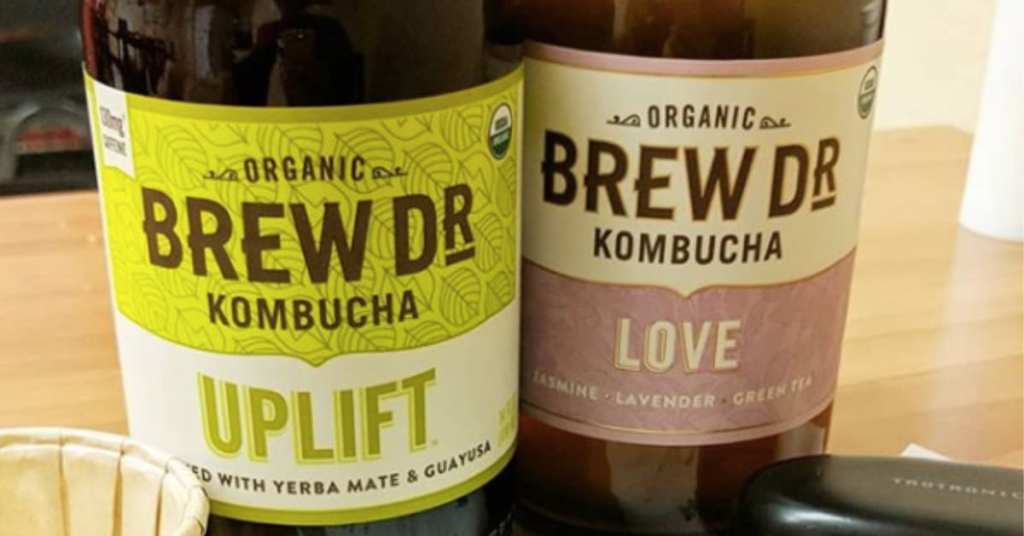You’d pretty much have to have been living under a rock to not have at least heard of the health craze surrounding kombucha. Even if you don’t know exactly what it is, you probably know that people think it’s good for you, right?
Enthusiasts claim it aids digestion, boosts the immune system, improves hair and skin health, detoxifies the liver, and can even help treat serious diseases like AIDS, cancer, and diabetes.
But is it really that good for you? Or even healthy at all?
https://www.instagram.com/p/B7mNEQulaNT/
So we got some info from two registered dietitians who ready to explain what it really does.
But first…
What is Kombucha?
Kombucha starts with a gelatinous blob known as a SCOBY (symbiotic culture of bacteria and yeast). It’s a collection of bacteria (often acetic acid bacteria) and yeast blobbing along together in harmony.
Then, the blob is placed into a jar of black or green tea and sugar, and given 7-14 days to ferment. During that time, the yeast and bacteria feed off the sugar, making the tea carbonated and slightly alc*holic (very slightly).
https://www.instagram.com/p/B7WwSMphqda/
To complete the process, a bottler removes the SCOBY, filters the tea, and stores the it in the fridge. Et voila!
How could kombucha affect your health?
Registered dietitian Despina Gandhi told Buzzfeed Health that acetic acid bacteria do have probiotic qualities, so drinking kombucha could conceivably aid in your GI health.
“Since so much of our immune system is influenced by our GI tract, by honing in on it, we can technically boost immunity as well.”
But registered dietitian nutritionist Angie Murad says it’s not quite a panacea.
“It’s not to say, though, that if you drink kombucha every day you’re not going to get a cold. It can just help you – it’s not something that’s necessarily harmful to your intestines.”
https://www.instagram.com/p/B7oWePqg7By/
Also, she says to make sure you’re drinking non-pasteurized kombucha for health benefits because the pasteurization process would effectively kill the good bacteria in your drink.
Aside from potentially boosting your GI health and immune system, there are no proven benefits to drinking kombucha – though some of the claims seem medically and scientifically possible.
In a 2014 review, kombucha was shown to reduce the ability of certain cancer cells to spread. It also seems that the antioxidant properties of the tea could help detoxify the liver and boost immunity.
A different study noted a drop in the blood sugar levels of diabetic rats who lapped the drink (but results based on lab rats don’t always translate).
It’s also possible that those same antioxidants could reduce the damaging effects of UV rays on the skin, but there’s no scientific studies on the effects of kombucha on skin or hair, specifically.
https://www.instagram.com/p/B7oUloDnvD3/
The one article that notes effects on AIDS patients suggests that the bacteria in kombucha could overstimulate the immune systems of HIV-positive people, which could actually be detrimental to their health.
Gandhi warns against taking any unproven claims to heart.
“The important thing to remember is there are no clinical trials that prove kombucha can do these things, so they’re really just claims and anecdotal evidence.”
And you always, always want to make sure you’re drinking kombucha from a reliable source – it could be a health risk if you’re not. Murad stressed,
“If you’re doing it at home, you can introduce bad bacteria into the system, and people have become very ill. So you have to be careful to have clean food practices when you’re fermenting the kombucha.”
If you ferment it too long, it could also lead to metabolic acidosis, another medical complication.
Bottom line? Both experts agree that there’s no harm in drinking store-bought kombucha, but it’s best to keep an eye on the sugar content and serving sizes.
Gandhi says that for her, the bottom line is that “it’s not necessary to be part of a balanced diet. It doesn’t contain a lot of vitamins, minerals, or anything like that.”
So, if you like it and feel better when you drink some…go for it (responsibly)!
If not, have some probiotic yogurt and you’ll be fine.
And now you know.






